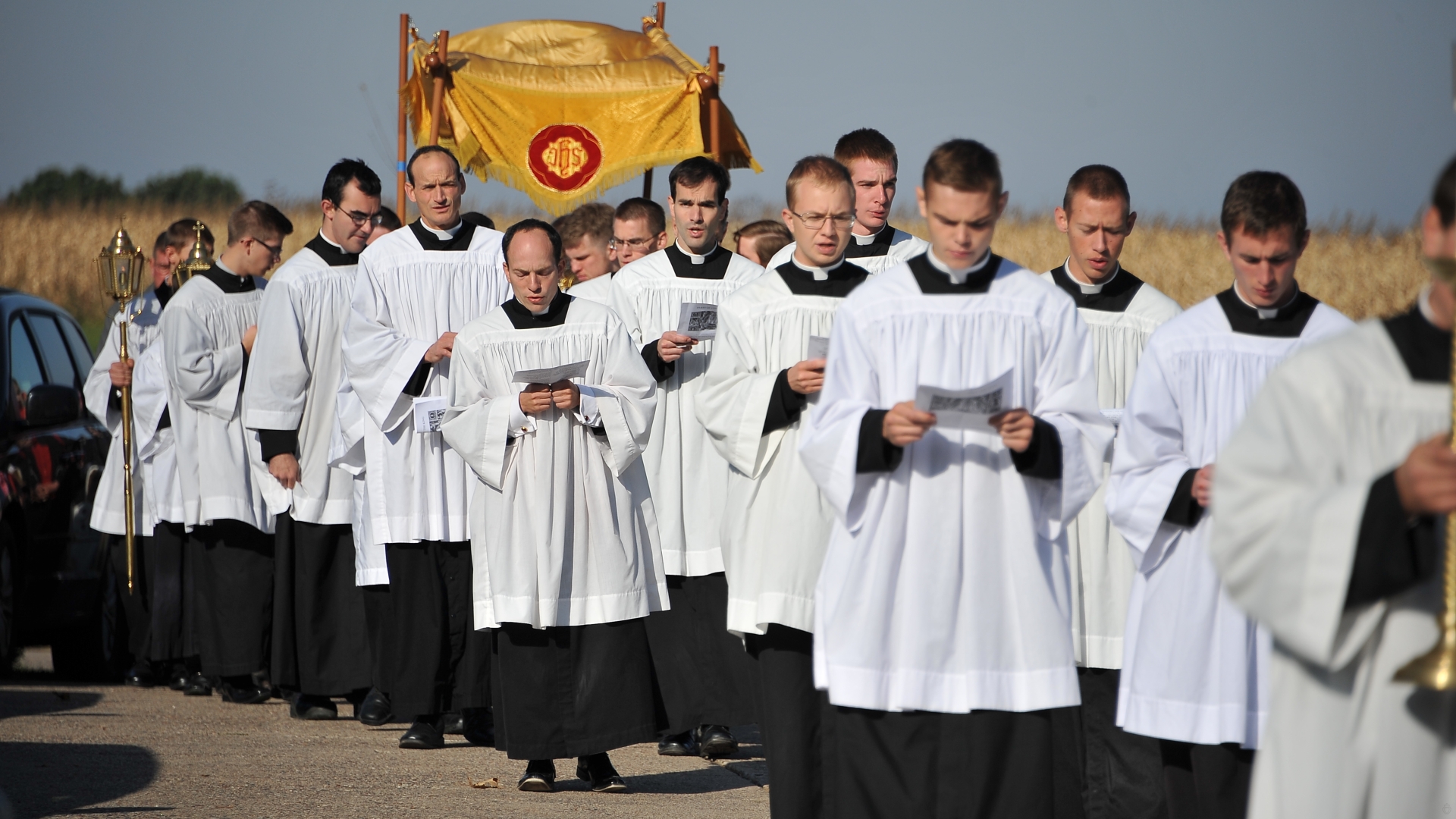Religious Vocation

A Spirit of Faith
WHAT IS A RELIGIOUS VOCATION?
It is a total life offering of self, an oblation, to God, for His glory, and one’s own sanctification.
Four Marks of the Religious
Archbishop Lefebvre, in his early writings on the religious, conferences given in Mortain [France], 1945-1947, he speaks of four marks of the religious: Rule of Life; Spiritual Prayer; The Religious Vows; and the Will of God, the Connection between Prayer and Obedience.
Rule of Life
Every religious order follows a rule of life set by its founder. The Rule is but a simple and very safe guide for leading to God. If the religious is faithful to the rule, he can easily save his soul and the souls of others. He must desire to do the will of another. In order to find life we have to die to ourselves and sin in order to live for Christ. The cross produces these effects in us. Nothing else does. That is the spiritual life. That is the very nature of holiness.
Spiritual prayer
The religious is a man of prayer who desires to communicate with God. As we go more deeply into the nature of prayer and its consequences for our existence, human and Christian, we come to realize that the profound life of the created soul, the redeemed soul, has to be a life of continual prayer. Every spirit, whether human or angelic, is ordained toward God by its spiritual nature, by its intelligence and its will, and gratuitously ordained by grace to enter into a participation of the eternal beatitude of the Holy Trinity. Thus every spirit is primarily religious, and its religious life finds expression in prayer: vocal, mental, and spiritual.
The Life of the Religious – The Vows
Spirit and Vow of Poverty - We should even practice poverty with respect to all that we have, such as personal gifts, money from the common purse, chalices, personal vestments, etc. We can include here poverty with respect to all that we are: voluntary deprivation of health, of the praise of men, of all that man holds dear, up to our last breath. This spirit of poverty (our total self-giving, our disinterested service, and the absence of desires for greater wealth or luxury) is inseparable from a fruit-bearing apostolate, and it convinces those outside the faith of the truth of our religion. Of course, we do not mean an unkempt appearance, a house which is in shambles and disarray, un-swept floors, or unwashed dishes. We mean an attitude which clearly shows that we are not interested in riches and expensive property, that ease, comfort, and luxury are foreign to us.
Spirit and Vow of Chastity - Virginity, a more perfect exercise of the virtue of chastity, is the will to abstain perpetually from these pleasures. This resolution makes virginity laudable, since one is renouncing a physical pleasure in order to be free for God. Virginity is certainly a more exalted state than marriage is, since it is the way to the contemplative life, procuring unspeakable benefits for the soul that meditates on the things of God.
Spirit and Vow of Obedience - There are generous men out in the world whose code of honor is to be loyal. “Rather die than be a traitor.” We have come to know countless officers, numerous courageous soldiers, pilots, and engineers. All these have tasted death in the line of duty, through an obedience that was heroic indeed, but still on a human level. And why do we hold back when it is a question of spiritual obedience? We have the assurance that no matter how it may seem to us at the time, obedience is the way of eternal life, of charity, of everlasting happiness. We should be soldiers of Christ. We should aspire to be His loyal officers who are ready to serve.
Will of God, the Connection between Prayer and Obedience
The religious seeks to do the will of God. For our actions to be a genuine offering of ourselves to God, our heart must be entirely open to His will. There is a close connection between the virtue of religion, which renders to God what is due to Him, and the fulfillment of God’s will. Prayer is an oblation. In prayer, one offers oneself in oblation to God for His praise, for His glory, and that oblation is carried out in our everyday life. Prayer is our declared oblation, whereas submission to the will of God is oblation practiced in daily life. For us who are in the religious life, we have our rules and constitutions, along with the directives of our superiors. Finally, we must so act as to bring our actions in line with God’s will for us, and thus our actions should serve as an oblation offered to God. Today God, through our superiors, tells you, “You will be here, you will do this, here is your rule, and here is your action…” You have to answer, “I am doing this because God wants it.” This oblation that we make of all of our actions is therefore a genuine prayer, a continual prayer. On the contrary, if we fulfill our own will rather than God’s, we can no longer offer our actions to God.